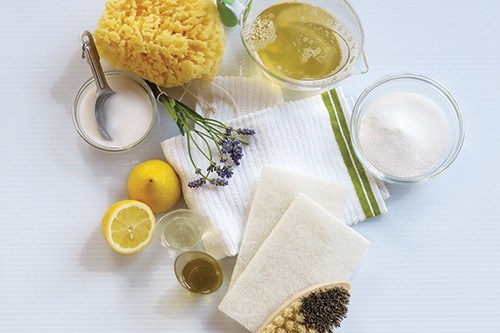
Put off by the chemicals found in commercial cleaning solutions, some are turning to Grandma's recipes for household cleaners to keep their kitchens sparkling. Homemade kitchen cleaners are celebrated as natural, eco-friendly and less expensive than store-bought cleaning products, but kitchen cleaning is serious business. Does a spritz of vinegar and water or a baking soda scrub kill bacteria as well as bleach or an ammonia-based product?
While many inexpensive and safe ingredients can be used as homemade cleaners that are gentler on the earth, homemade cleaners typically do not perform as well as commercial products that have been extensively researched and tested, according to the Environmental Protection Agency.
"Lemon juice, white vinegar, soap, isopropyl alcohol, salt, essential oils, borax and baking soda are environmentally safe, reasonable cleaners and unlikely to cause any reaction if used properly," says Joe Schwarcz, PhD, chemical expert and director of the McGill University Office for Science and Society. "These are reasonable cleaners that help remove and wash away dirt and germs from surfaces. However, most mix-at-home cleaning recipes do not have disinfectant properties that kill microorganisms."
It's Natural, but is it Safe?
Simple, green cleaners or plain water will do an adequate job if you use them regularly and don't let dirt accumulate. But all cleaners — commercially formulated or homemade — may be toxic at some level of exposure. Commercially formulated cleaning products are tested in accordance with standards set by the Consumer Product Safety Commission and the EPA, but terms like "green" and "natural" are not regulated by the government, and therefore not always reliable indicators when choosing cleaners.
"There is a mistaken belief that anything natural is good and everything synthetic is bad," says Schwarcz. "Natural products can be just as dangerous as synthetic ones. What really matters is how the solution is made, applied and what the data shows."
"While homemade recipes are touted as environmentally friendly, chemicals are in use, just like commercial products," says Brian Sansoni, vice president for sustainability initiatives, communication and membership at the American Cleaning Institute.
Tips for the Do-It-Yourselfer
Homemade cleaners are popular in part because you control what goes in them and how they smell. Before mixing natural cleaning solutions at home, keep in mind many homemade cleaning recipes have not been tested for safety assurance. So proceed cautiously: Common household chemicals can irritate eyes and skin and be dangerous if swallowed.
Start with clean containers. Empty cleaning or food bottles are not recommended because of potential reactions with residue in the containers. Label your container with ingredients, directions for use, emergency treatment guidelines and safety precautions. Store all cleaning products separately and never combine cleaning products; this could create dangerous fumes.
Try these eco-friendly homemade cleaning products:
- Baking Soda is an all-purpose, mildly abrasive cleaner and natural deodorizer. To make an all-purpose scrub, mix 1/2 cup baking soda with liquid soap to make a paste. Spread it on half a lemon or a sponge and scrub. Baking soda on a clean, wet sponge works well, too.
- Lemon is a deodorizer, stain remover and grease cutter that acts as mild bleach when exposed to sunlight.
- Olive Oil is a natural oil to nourish and polish wood.
- Liquid Castile Soap (or soap flakes, powder or bars) are biodegradable and will clean just about anything. To make a floor cleaner, mix 1⁄8 cup castile soap, 1⁄8 cup white vinegar, a gallon of water and a few drops of essential oils in a bucket.
- Borax (sodium borate) cleans, deodorizes and disinfects. Make a drain cleaner by flushing borax down the drain with one to two quarts of boiling water.
- White Vinegar is acidic and helps dissolve dirt, grease, and removes odors, stains and soap scum. Make an all-purpose cleaner by filling a spray bottle with equal parts water and white vinegar. Mix in five to 10 drops of essential oils. For mold and mildew removal, use full-strength vinegar and keep the windows open.
- Essential Oils mixed with water can serve as an antibacterial spray, or add them to your home cleaning solutions for a fresh scent. Mixing lemon juice, vinegar or baking soda along with a few drops of essential oil in a small dish absorbs odors.
- Washable, Reusable Microfiber Cleaning Cloths have ultrafine fibers formulated with sharp edges to trap dirt in microscopic pockets, releasing dirt when the cloth is washed.
Making homemade cleaning solutions isn't the only way you can reduce your environmental impact in the kitchen. In the store, look for the EPA's Design for the Environment seal, which identifies eco-friendly products. Choose phosphate-free cleaners when possible, and use the appropriate amount of the cleaning product. Run your dishwasher with only a full load and recycle whenever and whatever is possible.
